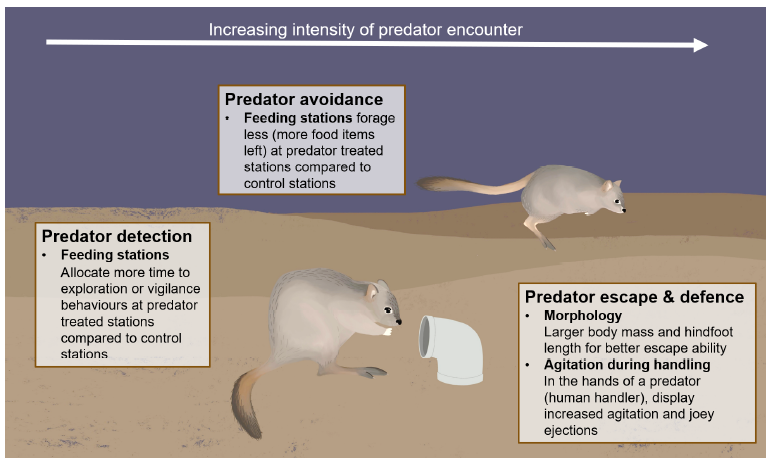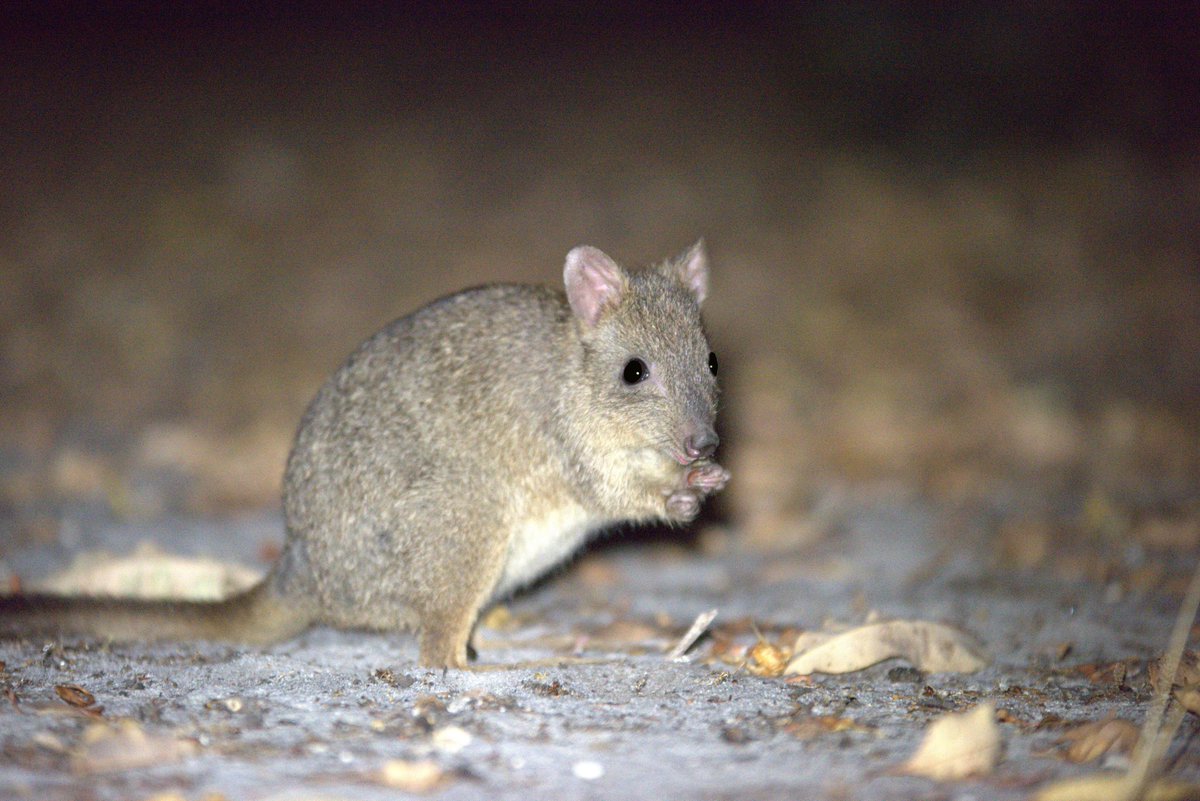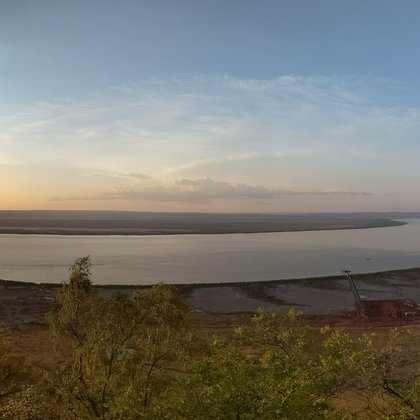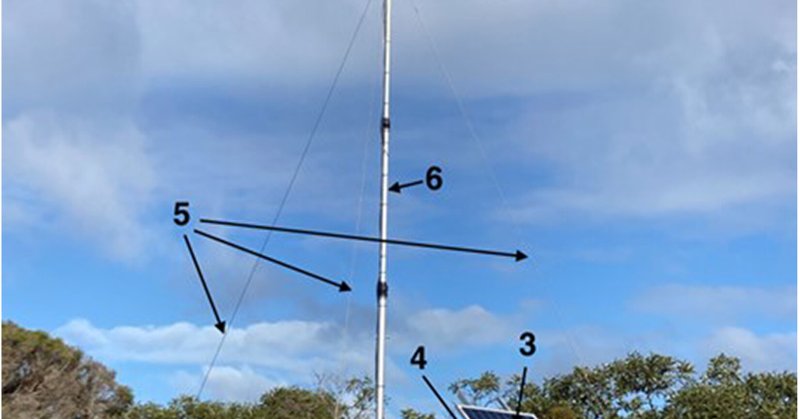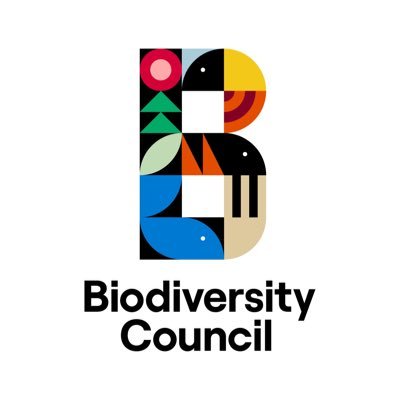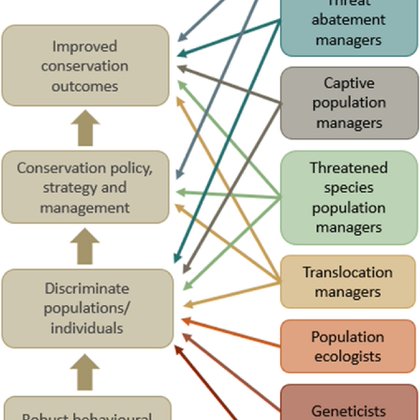
Tash Harrison
@tash_harro
Followers
373
Following
546
Media
19
Statuses
85
Conservation biologist and behavioural ecologist - working to preserve Australia's unique biodiversity
Walyalup
Joined July 2020
In a conservation haven free from invasive predators but containing chuditch, we were unable to detect any loss of anti-predator traits from the resident woylies! Could this be another tool for conservation managers? Read more here:
1
8
22
Native wildlife show off puzzle skills as animal researchers investigate problem-solving .@UWAresearch @BiolSci_UWA @misharowell .via @ABCaustralia.
abc.net.au
Bettongs, chuditch, quendas and antechinus as well as possums, skinks, kangaroos and echidnas were put through their paces to see which of our native animals could complete puzzles left in bushland.
0
2
8
RT @benflips: We are hiring! Postdoc in population biology, starting next year. Applications close late December 2023: .
staff.curtin.edu.au
Our mission is to transform lives and communities through education and research. Curtin employees form a unique and diverse community committed to innovative research and student learning. Find out...
0
33
0
RT @misharowell: Great to work with @tash_harro on this 😁 OA article can be read here 👉
onlinelibrary.wiley.com
Problem-solving is an important ability that allows animals to overcome environmental challenges. As such, it is a useful measure of behavioural flexibility and could be beneficial for conservation...
0
1
0
RT @SciclunaEmily: 🚨PROJECT OPPORTUNITY - Looking for student(s) interested in #ecology OR #populationgenetics to pursue an #Honoursproject….
0
17
0
Do you like solving puzzles? Woylies and koomal do too! @misharowell and I documented their problem solving attempts for the first time in Dryandra National Park. Read more:
1
8
47
RT @drmparrott: Awesome work by Natasha Harrison at #ams2023 investigating antipredator responses in haven & non-haven animals. Australia r….
0
4
0
RT @EnvEvidence: Brand new #PlainLanguageSummary for a #SystematicReview that looked at anti-predator responses in mammals 1/2 https://t.co….
0
4
0
RT @certhionyx: 📚 Myself and @benflips have some exciting PhD opportunities available in the field of genomics and spatial ecology. Please….
popbiolgenomics.org
Inference for the management of populations, across agriculture, health, and environment.
0
28
0
RT @chloehfrick: First paper for my PhD is out! ✨🦘🐀🤍 .We discuss the preliminary utility benefits of using coded VHF tags and autonomous mo….
onlinelibrary.wiley.com
Using coded VHF technology and autonomous towers to successfully monitor 28 reintroduced Brush-tailed bettongs (Bettongia penicillata). One animal was recorded 24,078 times within a 24 h period and...
0
11
0
Have you been loving all this woylie action? Check out this article and remember to vote for the woylie as Australia’s mammal of the year later this month!.
Meet the woylie, a furry, endangered creature with the most explosive vertical leap of any living being! But there's much more to these charismatic macropods. #Woylie #Fungivore #Marsupial .@BiolSci_UWA.@tash_harro.
0
2
13
RT @Biodivcouncil: New research finds endangered marsupial woylies have quickly evolved to lose anti-predator 'street smarts' in sanctuarie….
abc.net.au
Rapid evolution in protected havens is stripping threatened native marsupials of the "street smarts" they need to survive and escape predators in the wild, new research finds.
0
5
0
Read more about our (not so wiley) woylies here!.
Woylies in havens lose anti-predator traits. They are a common source of animals for reintroductions to former wild areas, but they may lack the match-fitness to evade predators. Great article @tash_harro @NickiJMitch @Jaana_Dielen Adrian @Science_DBCA.
0
1
10
RT @BiolSci_UWA: @BiolSci_UWA students @G_Blackburn_ , @tash_harro & @IsobelSewell will be presenting at this years @pintofscienceAU festiv….
0
5
0
Excited and grateful to have our project recognised by ESA, can't wait to share our findings in Darwin later this year!.
A collaboration between @BiolSci_UWA and @Science_DBCA has won the 2023 Ecological Impact Award!. The team is examining the loss of anti-predator responses in #criticallyendangered #woylies to better inform conservation management strategies. Congrats!
4
5
35
RT @mandy_ridley: Volunteer field assistant opportunity to work with the wonderful pied babblers in the magical Kalahari! @Ben_Ashton9 @Cor….
0
24
0
Come down and share a beer and some science with us! Looking forward to it 🎉.
@tash_harro, @IsobelSewell & I will be presenting at @pintofscienceAU on Tuesday 23rd May! Come along for a 🍺 and some cool 🐦, 🐟 & 🦘chat! ..@BiolSci_UWA @UWAresearch.
0
0
5
There was no one assay or cue that was most effective, but we revealed some important findings about experimental design; it is important to account for sexual dimorphisms in behaviour, to use organic predator cues, and to implement relevant control treatments.
0
0
0
Interested in quantifying anti-predator behaviour in mammals? We have just published a systematic review of the efficacy of different assays and predator cue types: @EnvEvidence @NickiJMitch @benflips @hemmi_lab @RochelleJean82.
environmentalevidencejournal.biomedcentral.com
Background Mammals, globally, are facing population declines. Protecting and breeding threatened populations inside predator-free havens and translocating them back to the wild is commonly viewed as...
1
5
25

